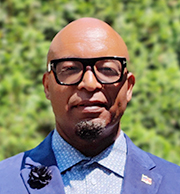
President's Letter: Making a Difference
By Melvin Fields | March 2022
 Greetings, fellow school counselors! I want to first acknowledge how much I appreciate you as a human being. James Baldwin, the famous African American author, said in his last interview, “Loving anybody and being loved by anybody is a dangerous risk. Loving of children, raising of children.” Your willingness to place yourself in harm’s way, sacrificing your own health, to meet the needs of students, staff, families and communities is to be commended. This year WSCA is excited to embark on our first ever hybrid conference as we focus on providing relevant SB 5030 topics while keeping safety in mind. One of the most important factors in personal safety and self-care is to recognize when we’ve reached our limit. Reaching a breaking point could be manifested from a collection of traumas that you’ve repeatedly experienced without relief.
Greetings, fellow school counselors! I want to first acknowledge how much I appreciate you as a human being. James Baldwin, the famous African American author, said in his last interview, “Loving anybody and being loved by anybody is a dangerous risk. Loving of children, raising of children.” Your willingness to place yourself in harm’s way, sacrificing your own health, to meet the needs of students, staff, families and communities is to be commended. This year WSCA is excited to embark on our first ever hybrid conference as we focus on providing relevant SB 5030 topics while keeping safety in mind. One of the most important factors in personal safety and self-care is to recognize when we’ve reached our limit. Reaching a breaking point could be manifested from a collection of traumas that you’ve repeatedly experienced without relief.Navigating COVID-19 for the past few years has revealed new challenges but also exacerbated some familiar ones, affecting adults and children in different ways. School counselors often hear stories of abuse, neglect, homelessness and racism, all of which are considered traumatic experiences for our students. Our counseling department has discussed adverse childhood experiences (ACEs) in partnership with fellow staff members. Sharing knowledge about trauma across the building brought about a heightened sense of awareness. Our school counseling department and staff developed relationships, cast our nets and offered interventions including mental health supports.
I have noticed over the past few years that some parents are desperately seeking help because they’re overwhelmed by issues such as financial constraints, food insecurity or past trauma. Most of us have experienced an increased workload because some of the parents, grandparents or guardians have reached the breaking point and are looking to the school counselor as a person that cares. Schools are providing more social services to entire families, hoping to increase educational opportunities for students. Absenteeism is of concern and in some cases, students are absent due to a fear of COVID-19. Others are absent due to an inability to adapt socially to large groups of people and loud noises after experiencing an extended period of isolation due to the pandemic. Our district augmented our school counseling support structure with a social worker. She serves as a liaison with mental health resources and coordinates home and community-based wraparound service for both the parent and student.
The comprehensive school counseling program, as outlined in the recently passed SB 5030 bill, provides space for relationship building to develop and provide targeted interventions. The ASCA Mindsets & Behaviors for Student Success specifically addresses social/emotional development in the face of trauma. The Annual Administrative Conference allows for direct conversations as a leader with the school administration on issues of trauma and students’ feelings of belonging within their school environment. Mindset Standard M1 calls for school counselors to encourage the development of whole self, with a healthy balance of mental, social/emotional and physical wellbeing. Behavior Standard B-SMS 7 is used to demonstrate effective learning skills when faced with problems.
Dr. Maya Angelo’s quote, "Be a rainbow in somebody else's cloud" was describing all types of individuals who showed her kindness through her difficult times. Remember, you are making a difference each time you enter your school building!
Contact Melvin Fields, WSCA president, at melvinfieldswsca@gmail.com.